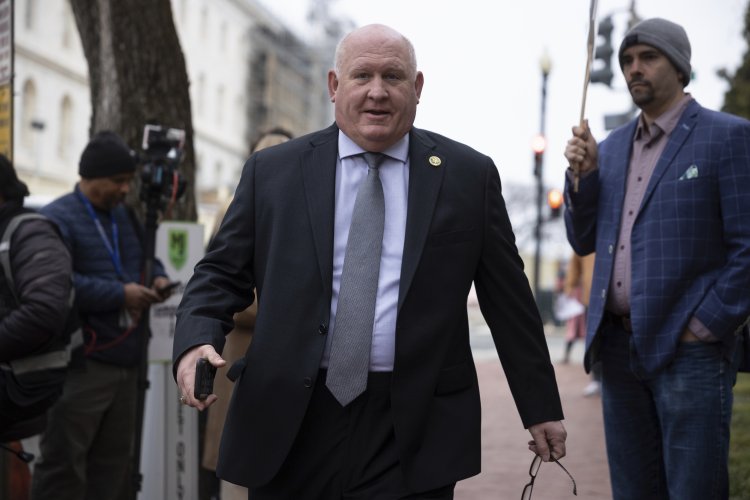White House concerns temper GOP proposals to distribute food-aid funds to states
There is increasing worry over potential benefit cuts that may adversely affect the very voters who supported President Donald Trump.

Lawmakers are considering over a dozen variations of a tentative plan aimed at reducing federal spending on the Supplemental Nutrition Assistance Program by requiring states to absorb a portion of the costs, as shared by five individuals who requested anonymity to discuss the confidential negotiations. Governors would face the choice of either covering these expenses or imposing new eligibility limits for food aid in their states.
With ongoing changes to Medicaid also on the Republican agenda, White House economic and political advisers are wary of adding additional pressure on states that lean heavily Republican and on Trump voters, which could jeopardize the passage of the comprehensive bill. These advisers have generally advocated for a cautious approach to reforming food assistance, resulting in Republicans on Capitol Hill stepping back from the most extreme proposals.
Discussions regarding the potential cuts to federal funding for SNAP, which supports over 40 million low-income Americans and was previously known as food stamps, are still in progress. According to senior GOP leadership aides, the House Agriculture Committee, responsible for overseeing the program and achieving $230 billion in savings, is lagging behind other legislative panels.
The proposed reforms are part of a broader set of House GOP initiatives targeting SNAP, which is viewed by many House Republicans as plagued by overpayment issues. These proposals include future restrictions on food aid benefits for families, barring undocumented immigrants from receiving benefits, instituting stricter work requirements, and imposing penalties on states for overpayment mistakes.
While changes to SNAP are politically sensitive, they have not generated as much contention within the GOP as possible cuts to Medicaid. A White House official, who spoke on the condition of anonymity to discuss internal dynamics, indicated that the administration aims to prevent a “one-two punch” to low-income MAGA supporters and red states ahead of the midterms, which could strain their budgets.
Current iterations of the proposal would delay any cost-sharing until after the 2026 midterms, or potentially after the 2028 presidential election. This timeline reflects a recognition among Trump officials and senior Republicans on the Hill that some of their most vulnerable members are already targeted by Democratic ads alleging cuts to safety-net programs to fund tax reductions for the wealthy. Republicans also intend to provide states with sufficient time to adjust to these potential changes.
The proposed SNAP adjustments could have a disproportionate impact on Senate battlegrounds like Georgia and North Carolina, presidential swing states such as Arizona and Pennsylvania, and blue states like New York and California, where many vulnerable House GOP members reside.
House Republicans have scaled back an earlier proposal that aimed to gradually increase state responsibility for SNAP costs to 25 percent by the end of the next decade. The most recent proposals would cap state expenses at 22.5 percent at the end of the ten-year period, while also extending the timeline for implementing the requirement.
No definitive decisions have yet been reached regarding these proposals, and plans for a House Agriculture meeting to discuss the legislation are still uncertain. Although Republicans had initially aimed for a markup on May 8, it now appears that May 7 is more likely, with a possibility of further delays into the following week.
A spokesperson for the House Agriculture Committee stated that Chair G.T. Thompson “is doing his due diligence to leave no stone unturned in finding reforms that will curb wasteful spending, and that includes looking at how states administer SNAP, which spends over $13 billion per year in erroneous payments.”
“All options to rein in that waste and incentivize better state administration of the program are on the table,” the spokesperson noted. A White House spokesperson has yet to respond to recent inquiries.
Republicans face challenges reconciling the House GOP’s budget goal of $230 billion in spending cuts with the Senate’s target of a minimum of $1 billion. Some lawmakers express skepticism about the House's ability to achieve $230 billion in SNAP reductions, and senior Republicans have privately assured at-risk party members that the final bill would likely be more moderate. However, Speaker Mike Johnson has committed to delivering significant spending cuts, prompting one House Republican to state that the Agriculture panel will “have to hit” its target.
Beyond the White House's concerns over SNAP, Republicans are navigating a range of competing priorities. Vulnerable members are particularly attuned to changes that could strip benefits from their constituents, preferring a more moderate approach, according to two Republicans granted anonymity to discuss the negotiations.
Conversely, a significant faction of the GOP is pushing for substantial cuts, arguing that blue states take advantage of the program by reinstating the pandemic-era benefit increases established by the Biden administration. Many believe that requiring states to shoulder even a small percentage of SNAP costs would compel more careful management of the program.
Most White House officials involved in discussions about the cost-sharing proposal in recent months are not outright opposed to it; however, Trump officials have cautioned against penalizing states that leaned heavily in favor of the president in 2024.
One individual familiar with the discussions remarked that deep-red states like West Virginia “are going to be hit pretty hard by this,” while states such as Mississippi, Louisiana, Oklahoma, Alabama, and Florida, which also supported Trump in large numbers, would face significant financial burdens.
Senior Republicans are making efforts to build support among vulnerable members, particularly those from blue states that could bear substantial financial responsibilities for SNAP if the GOP proposals ultimately proceed.
The House Agriculture Committee’s segment of the Trump megabill is also expected to feature provisions aimed at reauthorizing the Secure Rural Schools program, which provides federal funding for essential public services in counties with extensive tax-exempt federal lands. This legislation has garnered support from Rep. David Valadao and other at-risk Republicans, who have publicly and privately cautioned against deep cuts to safety-net programs.
Jessica Kline for TROIB News
Find more stories on Business, Economy and Finance in TROIB business












